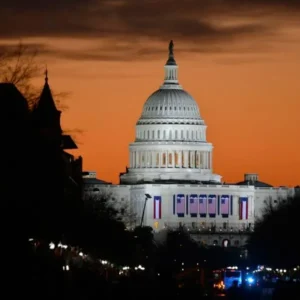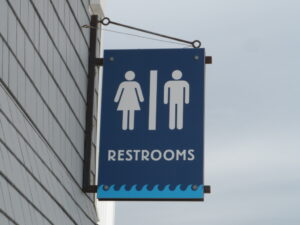Within a few minutes of waking up each morning, I find myself often partaking in the endless scroll of my Twitter feed. It has become something of a ritual for me; rolling over groggily, clicking on that bright, cheerful bird icon, only to reveal a slew of all of the world’s problems. The morning of Wednesday, May 6th was no different than any other in this sense. I opened up my blue app, and the trending page revealed that the woman of the hour was Betsy DeVos. Perhaps the United States Secretary of Education had broken her silence to come to the aid of millions of displaced American students, struggling to adjust to an entirely new system of learning?
Well, of course not. On that fateful Wednesday, Betsy DeVos chose instead to announce the Trump Administration’s new goals for Title IX. These new aims entirely alienate victims of sexual assault, and come to the defense of accused predators. Well, that’s my opinion, anyway (and the opinion of survivors’ advocates everywhere). Allow me, and my personal pronouns, to take a step back.
Firstly, what is Title IX? It is a forty-eight year old federal law that prohibits sex discrimination in programs that receive federal funding. The Title states:
“No person in the United States shall, on the basis of sex, be excluded from participation in, be denied the benefits of, or be subjected to discrimination under any education program or activity receiving Federal financial assistance” (U.S. Department of Education).
Title IX has become a more prominent discussion topic in the sexual violence discourse in the past few years. Even preceding DeVos’s recent rules, cases of sexual assault within high-profile colleges has raised the question of how schools should be handling these situations.
Under the Obama administration in 2011, the Dear Colleague Letter was issued by the Office for Civil Rights. The OCR strongly advised against the cross-examination of the accusers (Washington Post). The Letter also clearly defines sexual assault:
“In the context of the letter, sexual violence means physical sexual acts perpetrated against a person’s will or where a person is incapable of giving consent. A number of acts fall into the category of sexual violence, including rape, sexual assault, sexual battery, and sexual coercion” (U.S. Department of Education).
The Trump Administration’s new interpretation of Title IX, in the eyes of Betsy DeVos, includes some “historic changes” (NPR) to the Obama-era rules. DeVos aims to end “Kangaroo Courts” (The Washington Post) that supposedly ensued following the Dear Colleague letter.
This meaning, DeVos wants to better protect students accused of sexual misconduct. To this end, the new rules mandate live hearings by adjudicators, and real-time cross examination of each student by the other student’s lawyer or representative. DeVos says this is simply a matter of fair judgement, and aims to prevent false accusations with these thorough proceedings. DeVos represents the voices of many conservative Americans with this new policy; many believe that men can all too easily be falsely accused of sexual misconduct with minimal evidence, and punished for a crime they did not commit.

Credit: The Guardian
Allow me to interject. First, some facts: over the past twenty years, only 2-10% of rape accusations are proven to be fake, according to the authors of this US Study. The FBI has pinned the number of “unfounded rapes” – rapes determined to be false after investigation – at 8% (BBC). This makes for a minuscule number of false accusations, particularly when taking into account to the sheer amount of unreported sexual assault cases that make evident the fact that victims feel uncomfortable coming to their own defense more often than they unjustly point fingers. Although false accusations are terrible, one must wonder why DeVos wants to defend this tiny percentage of accused predators, while directly alienating the far, far, larger population of honest victims.
And let’s get something straight. She is silencing the voices of victims. Being the victim of sexual misconduct is a deeply traumatizing experience, which is why so many cases of rape often go unreported. With the added threat of a victim being grilled by the lawyer of their rapist? Of testifying in front of a live audience that does not believe them? Expect the cases of reported rape to plummet in the coming years. No, not due to DeVos’s genius, her apt shut down of false accusers – because traumatized victims don’t want to be treated like criminals.
DeVos even went so far as to narrow the definition of sexual assault, so only that which is “severe, pervasive and objectively offensive” warrants investigation (NPR). This is in stark contrast to the Obama Administration’s definition, which identified sexual acts without consent to be assault. This Obama-era definition allowed victims to report incidents where they felt violated. This new definition further prohibits victims from being able to get justice for the crimes committed against them. Whether a case of sexual misconduct is considered ‘objectively offensive’ is entirely out of the control of the victim.
To me, Betsy DeVos’s actions are a heinous violation of civil rights. To me, this gives the accused unjust amounts of power over a vulnerable victim. Cross examination is not nearly so disturbing for the one who committed the crime as the one who suffered through it.
Why should BHS students care? Title IX dictates how all public schools in the United States handle cases of sexual assault. We are not just talking colleges here; remember, the Title applies to places of education that receive federal funding. We’re talking kindergarten, middle school, high school, everything. Sexual assault is a prevalent problem in every grade level. Why should a kid my age or younger, having experienced something traumatic, be cross examined simply for wanting justice? Why should a kid my age be denied justice simply because of an inflexible definition? What if these things happen to me, as I move into my senior year, and graduate to college?

Credit: Twitter – a reference to the #MeToo hashtag first circulated in October 2017, and DeVos’s Title IX interpretation in 2020.
I will end this where it began: my Twitter page. While many find the scroll of bad news to be a particularly depressing venture, I find it imperative to stay informed. I find my small corner of the digital universe, in which the people I follow care deeply about injustices such as these, to be comforting more than anything.
 Press "Enter" to skip to content
Press "Enter" to skip to content






